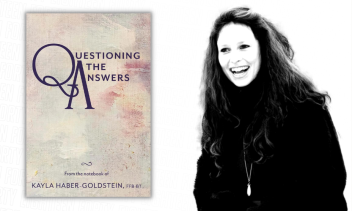We turn to God during Elul for forgiveness. We apologize, regret, and earnestly await its reception. God is compassionate, merciful, loving, so it comes as no surprise that sincerity succeeds. But God cannot be the arbiter of all wrongdoing.
Indeed, Mishnah Yoma 8:9 teaches that “Yom Kippur atones for transgressions between a person and God, but for a transgression against one’s neighbor, Yom Kippur cannot atone unti he appeases his neighbor.” We are, as it were, at the mercy of our friend, the will of their compassion, when we wronged them. Our “sorry” sent to God is inappropriate in that case. It is our friend whom we must turn to. Simple as it may seem, that is challenging.
The formula of “sorry” should be easy enough: Acknowledge your wrongdoing and promise to do better. But it seems like humans universally struggle with it. We turn to the Talmud for timeless wisdom to improve our apology instincts.
1. Megillah 28a: Timely Apologies
שָׁאֲלוּ תַּלְמִידָיו אֶת רַבִּי נְחוּנְיָא בֶּן הַקָּנָה: בַּמֶּה הֶאֱרַכְתָּ יָמִים? אָמַר לָהֶם: מִיָּמַי לֹא נִתְכַּבַּדְתִּי בִּקְלוֹן חֲבֵרִי, וְלֹא עָלְתָה עַל מִטָּתִי קִלְלַת חֲבֵרִי, וּוַתְּרָן בְּמָמוֹנִי הָיִיתִי.
Rabbi Neḥunya ben HaKana was once asked by his disciples: In the merit of which virtue were you blessed with longevity? He said to them: In all my days, I never attained veneration at the expense of my fellow’s degradation. Nor did my fellow’s curse ever go up with me upon my bed. And I was always openhanded with my money.
Grudges worsen with time. Resentment bubbles and boils until we muster the strength to remove its toxicity from our system, lest we allow it to fester forever. That is why timely apologies are crucial. We say sorry for the friend we insulted, the family member we hurt—for their benefit, not ours. The apology should accommodate their schedule, not ours. The sooner we express our regret, pain, and wrongdoing, the sooner they can begin to forgive and heal.
Granted, the Gemarah soon after reads Rabbi Nehunya’s words in a different lens, positioning him as the wronged, not the wrongdoer:
וְלֹא עָלְתָה עַל מִטָּתִי קִלְלַת חֲבֵרִי — כִּי הָא דְּמַר זוּטְרָא כִּי הֲוָה סָלֵיק לְפוּרְיֵיהּ, אֲמַר: שְׁרֵי לֵיהּ לְכל מַאן דְּצַעֲרָן.
Rabbi Neḥunya also said: Nor did I ever allow the resentment caused by my fellow’s curse to go up with me upon my bed. This is referring to conduct such as that of Mar Zutra. When he would go to bed at night, he would first say: I forgive anyone who has vexed me.
Even so, Rav Steinzalt’s explanation of the first quoted lines aligns with our first reading. But regardless, the fact that Mar Zutra knew how forgiving anyone who has “vexed” him needed to be done on that day, so, too, we can understand why the wrongdoer should apologize that same day.
2. Derekh Eretz Rabbah 4: No Repeat Offenses
In this unknown “minor tractate,” we see two rabbis play out the offender-offended, apologizer-forgiver dynamic. It displays the Talmud’s second teaching for us.
מעשה ברשב״א שבא ממגדל עדר מבית רבו והיה רוכב על החמור ומטייל על שפת הים ומצאו אדם אחד שהיה מכוער ביותר אמר לו ריקה כמה מכוערין בניו של אברהם אבינו. אמר לו ומה אעשה לך אמור לאומן שעשאני. מיד ירד ר״ש בן אלעזר מן החמור ומשתטח לפניו אמר לו נעניתי לך מחול לי.
It once happened that R. Simeon b. Eleazar was coming from Migdal Eder from the house of his teacher and was riding leisurely on his ass by the seaside. A certain man chanced to meet him, who was exceedingly ugly. He said to him, “Empty one, how ugly are the children of Abraham our father!” The other replied, “What can I do for you? Speak to the Craftsman Who made me.” R. Simeon b. Eleazar immediately dismounted from the donkey, prostrated himself before him and said to him, “I apologize to you, forgive me.”
This man, seemingly unprovoked, harassed Rav Shimon but was quickly rebuffed with class and wit. Immediately, he begs forgiveness, but Rav Shimon knows that his words are insufficient. Read on for his following lesson:
אמר לו אין אני מוחל לך עד שתלך לאומן שעשאני ותאמר לו כמה מכוער כלי זה שעשית. הלך אחריו חצי מיל שמעו בני עירו ויצאו לקראתו אמרו לו שלום עליך רבי. אמר להם למי אתם קורין רבי. אמרו לו לזה שמטייל אחריך. אמר להם אם זה רבי אל ירבה כמותו בישראל. אמרו לו ח״ו ומה עשה לך. אמר להם כל הענין. הפצירו בו מאד שימחול לו. אמר הריני מוחל לו ובלבד שלא יהא רגיל לומר כן.
He replied to him, “I will not forgive you until you go to the Craftsman Who made me and say to Him, “How ugly is the vessel which You have made!” R. Simeon walked behind him for three mil. When his fellow citizens heard [of his arrival] they came out to meet him, greeting him with the words, “Peace be upon you, Rabbi.” The man said to them, ‘Whom are you calling Rabbi?’ They answered, ‘He who is walking behind you.” Thereupon he exclaimed, “If this man be a Rabbi, may there not be any more like him in Israel!” He told them the whole story. They earnestly begged him to pardon him, and he replied, “I will forgive him, but only on condition that he does not act in the same manner again.”
Empty apologies are worth their hollow contents. True teshuva, as Rambam lays out in Hilchot Teshuva, depends upon the commitment to cease harmful behaviors. Otherwise, the words of sorry are less than the air they encounter.
3. Berakhot 28a: Mean What You Say
Last, we return to the core of your apology: sincerity. There is nothing more obvious, nor more frustrating, than inauthenticity.
תנא אותו היום, סלקוהו לשומר הפתח ונתנה להם רשות לתלמידים ליכנס. שהיה רבן גמליאל מכריז ואומר: כל תלמיד שאין תוכו כברו, לא יכנס לבית המדרש.
It was taught: On that day that they removed Rabban Gamliel from his position and appointed Rabbi Elazar ben Azarya in his place, there was also a fundamental change in the general approach of the study hall as they dismissed the guard at the door and permission was granted to the students to enter. Instead of Rabban Gamliel’s selective approach that asserted that the students must be screened before accepting them into the study hall, the new approach asserted that anyone who seeks to study should be given opportunity to do so. As Rabban Gamliel would proclaim and say: Any student whose inside, his thoughts and feelings, are not like his outside, i.e., his conduct and his character traits are lacking, will not enter the study hall.
Postscript
Why is it so hard to say sorry today? That’s not asked begrudgingly. It’s a genuine question—one Jessica Bennett explored in her New York Times piece, “He’s Sorry, She’s Sorry, Everybody Is Sorry. Does It Matter?”
It is inevitable that people will make mistakes and insult others. Anyone who plays the game of life is bound to trample upon some souls. What can be changed is how we act in the aftermath of transgressions. Saying sorry should not be robotic or reflexive. No two apologies should be alike for just like every person is unique, so, too, is every hurt feeling.
The Talmud showed us three ways to create better apologies: (1) Make them timely, (2) make them the last, (3) make them sincere. With this ancient wisdom, we can enter contemporary times with a more compassionate tongue.







